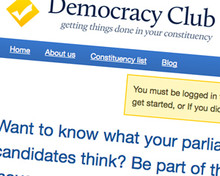
Take the newly fledged Democracy Club, for example; a collaboration developed in the run-up to the general election. Its volunteers have been busy surveying parliamentary candidates in the run-up to 6 May, with the aim of documenting their positions on big issues, both locally and nationally.
mySociety, behind some of the UK's best known civic transparency projects, is supporting the Democracy Club in tracking candidate activity all over the country. The aim, says Tom Steinberg, mySociety founder and director, is to be precise about the simple issues.
"At elections things tend to be very vague and rhetorical, even when there are issues that are very simple," he tells Journalism.co.uk.
So, the Democracy Club - made up of over 6,000 volunteers - has surveyed all the parliamentary candidates they know about, asking them very clear questions. Yesterday, they reported that 1000 candidates have answered the TheyWorkForYou survey so far.
Then journalists and citizens will be able to use this open data to make informed election choices. Citizens will be able to find out with which candidate they are most aligned. Journalists meanwhile, can use the data for statistical analysis.
But the real clincher will come after 6 May: the successful candidates' data will be fed into mySociety's theyworkforyou.com, a powerful monitoring tool that records MPs' voting behaviour.
Therefore, explains Steinberg, users will be able to compare what a hopeful candidate said when they were running for election, with what they actually do when in office.
"The really long term goal is that we compare their voting record with what what they said."
Another element of Democracy Club is YourNextMP.com, a database of the candidates who are standing in 2010. "Many people are surprised to hear such a thing doesn't exist," says the project. "The major parties maintain lists that they'll send to journalists, and some of them publish their lists online. But it's hard to find all this in one place."
The final element of Democracy Club is the StraightChoice project, developed by Francis Irving, Julian Todd and Richard Pope. It's a growing database of election leaflets, an important monitoring tool in the run-up to the election.
If Steinberg was a journalist, he says, he would certainly be looking at their leaflet sets for stories.
The StraightChoice, which currently holds 3602 leaflets, is focused on 'real time' monitoring, to create a "live visualization" of leaflet campaigning.
But perhaps it could also prove powerful for the next election and during the winning candidate's term; it will provide a digital record of the promises and claims made by the hopefuls - before they were elected.
As Democracy Club says, "How is what they're saying on leaflets different from what they're saying elsewhere?"
That comparison, not possible between 2006 and 2010, could damage a party or candidate's credibility and help us better monitor our elected members' behaviour.
Tom Steinberg's political tracking tips for journalists / bloggers
- Sign up for email alerts from theyworkforyou.com for specific MPs or issues (or tailored RSS feeds)
- Keep an eye on new policies that appear on theyworkforyou.com; you might see contentious issues neglected by the media
- Use Democracy Club's survey results for statistical analysis of candidates' intentions (when released)
- Sign up to the Democracy Club to receive updates on the project's development
Do you have more examples of citizen accountability initiatives? Share them in the comments, or by Twitter to @journalismnews.
Free daily newsletter
If you like our news and feature articles, you can sign up to receive our free daily (Mon-Fri) email newsletter (mobile friendly).
Related articles
- TheyWorkForYou plans search and usability upgrades
- #Tip of the day from Journalism.co.uk - local map widgets
- New Channel 4 site analyses 'who knows who' in UK politics
- Local media face threat from 'silent killers' online, says mySociety founder
- mySociety turns five - how can journalists best use its sites?









